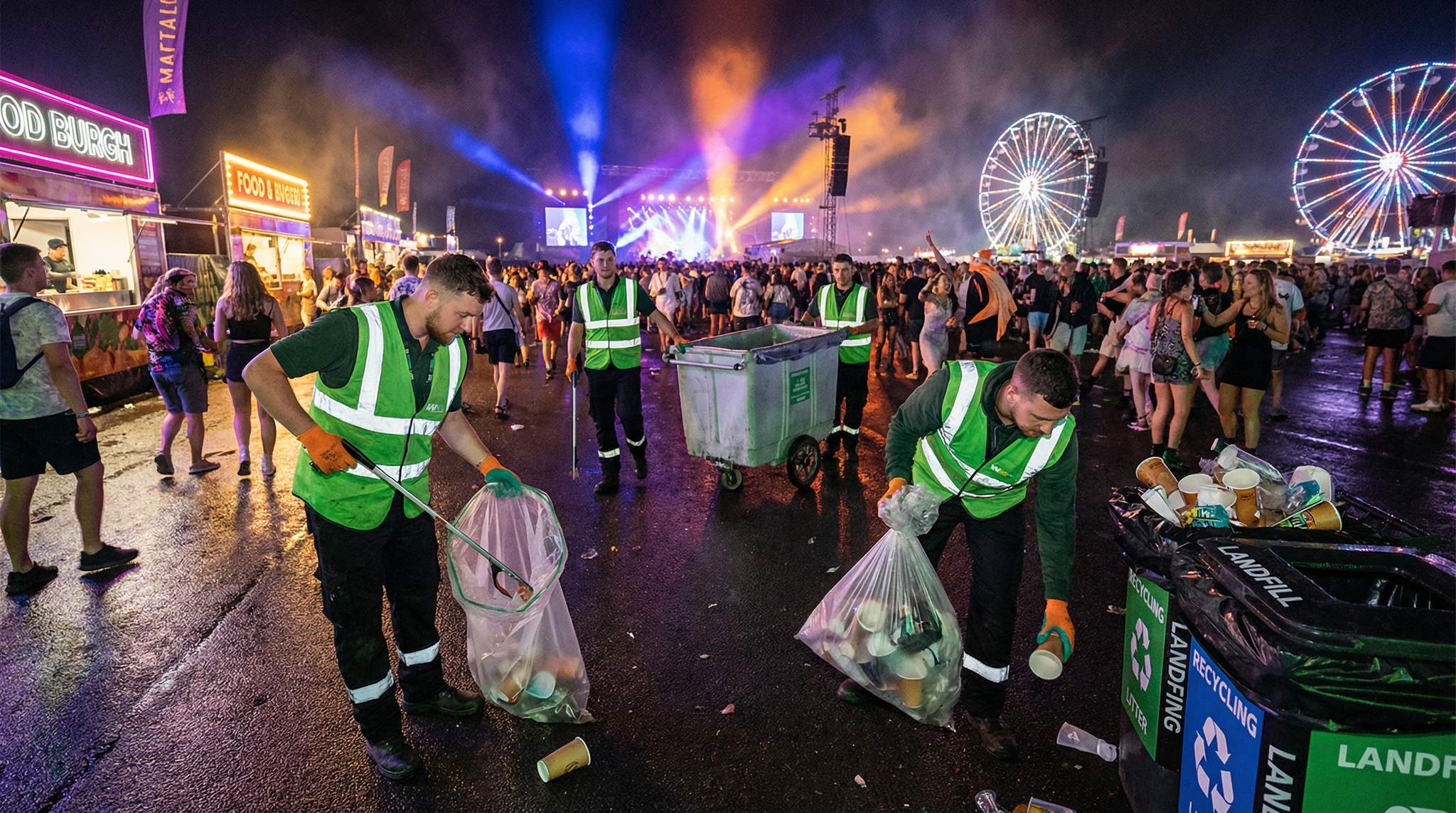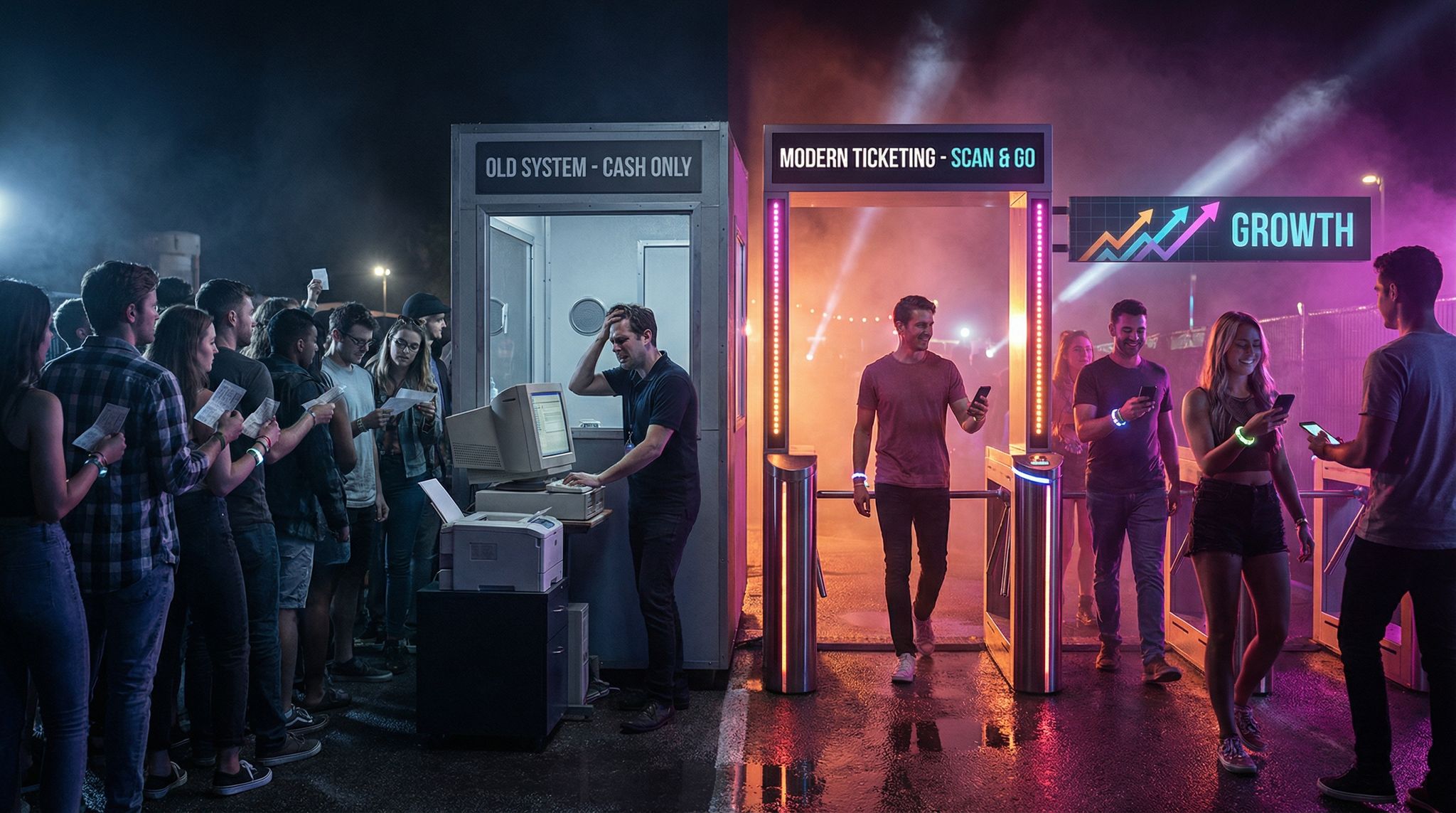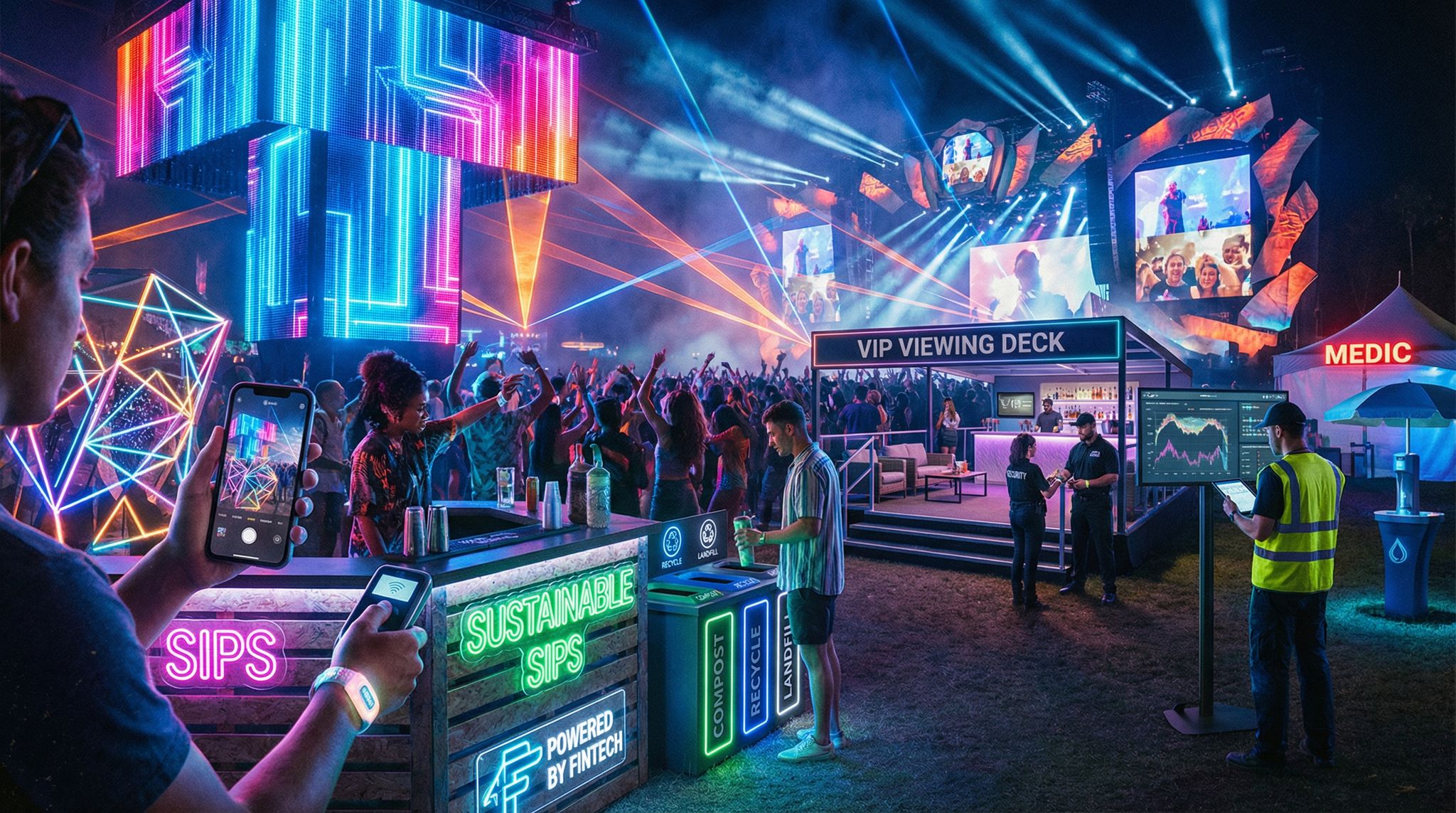Keeping a festival site clean and pleasant is a never-ending task. Waste management during the event requires continuous attention, not just a big cleanup after the music stops. Seasoned festival producers emphasize that the job of trash handling is ongoing from the moment gates open until the last attendee leaves each day. By maintaining cleanliness in real-time, organizers create a safer, more enjoyable environment and prevent an overwhelming mess at day’s end.
The Dedicated “Green Crew” on Site
A proven strategy is to deploy a dedicated waste management team often called the “Green Crew”. This crew’s sole focus is keeping the grounds tidy throughout the event. They rove the venue in shifts, emptying bins before they overflow and picking up litter before it spreads. Members of the Green Crew may wear bright vests or uniforms so they are visible and can quickly address waste issues. Many festivals even recruit volunteers or staff specifically for this role, ensuring that there are always extra hands available to respond to trash and recycling needs.
Green Crew duties typically include:
- Emptying and replacing bin liners regularly: They check trash, recycling, and compost bins at frequent intervals and swap out bags to prevent overflow.
- Patrolling for litter: Crew members continuously walk high-traffic areas (food courts, stage fronts, entrances) to pick up dropped cups, bottles, and other debris before it accumulates.
- Monitoring problem areas: If certain spots tend to generate more waste (like near food vendors or restrooms), the team pays special attention to keep those zones clean.
- Educating and guiding attendees: A well-trained Green Crew can politely encourage festival-goers to use the proper bins and even help them sort items into trash vs. recycling or compost. This friendly presence boosts public cooperation in keeping the venue clean.
By having a Green Crew active throughout the event, festivals send a clear message that cleanliness and sustainability are priorities. This not only keeps the site looking good, but also fosters a culture where attendees themselves are more likely to pick up after themselves.
Turn Fans Into Your Marketing Team
Ticket Fairy's built-in referral rewards system incentivizes attendees to share your event, delivering 15-25% sales boosts and 30x ROI vs paid ads.
Scheduled Sweeps and Shift Planning
Even with continuous spot cleaning, scheduling regular cleanup sweeps is essential. Create a timetable for major trash “sweeps” at key times of day. For example, after meal times or a big headliner performance, schedule an intensive pass where the crew fans out to collect litter and empty every bin. If the festival runs into the night, plan a thorough cleaning sweep once crowds thin out or after closing each evening. In multi-day festivals, perform a big end-of-day cleanup so the next morning starts fresh.
Some events with particularly large crowds require the grounds to be swept constantly throughout the day, not just after hours. In these cases, cleaning is a rolling process where as soon as one cycle ends, another begins. The operations team should adjust the cleaning frequency based on the event’s needs – a family-friendly day festival might need less continuous attention than a high-energy music festival where trash can pile up quickly. The goal is to never let the waste get ahead of the crew.
Planning a Festival?
Ticket Fairy's festival ticketing platform handles multi-day passes, RFID wristbands, and complex festival operations.
Tips for effective scheduling:
- Use shifts to cover all hours: Organize the Green Crew into shifts covering the entire event duration (including late nights if needed). This prevents fatigue and ensures fresh team members are always ready to work.
- Overlap during peak times: Schedule extra crew members during anticipated peak trash periods (e.g. lunchtime, evening shows) so bins get emptied faster and litter is picked up promptly.
- Nightly reset: If the venue permits, include a late-night or very early morning crew to do a final sweep of the day. Collecting any straggling trash each night ensures a cleaner start the next day and avoids unpleasant surprises in the morning.
- Adapt to conditions: Remain ready to deploy more cleaners if unexpected messes happen (like a spilled trash can or windy weather spreading litter). Flexibility in the cleaning schedule helps tackle issues before they escalate.
Preventing Overflow: Managing Bins and Dumpsters
Overflowing trash bins can turn a great festival into a grimy eyesore. To avoid this, careful bin placement and dumpster management are key. Start by providing plenty of waste receptacles in convenient locations. Every food vendor area, stage viewing area, restroom, and walkway should have clearly visible bins for trash, recyclables, and possibly compost. Place them at exits too, so people can toss garbage on the way out instead of littering the parking lot or neighborhood.
All bins should be sturdy and lined with heavy-duty bags that can be sealed and removed easily by the Green Crew. It’s wise to have spare bins or liners on hand in case they fill up faster than expected. In larger festivals, radio communication or a messaging system can alert the crew when a particular bin is nearing full so they can service it immediately.
Behind the scenes, plan for how to handle the collected waste. Dumpsters or skip bins placed at strategic locations (backstage or at service roads) serve as the drop-off points for full trash bags. Coordinate with a waste disposal contractor to swap or empty dumpsters regularly throughout the event. For multi-day events, it often means scheduling a garbage truck pick-up each morning or overnight when attendee traffic is low. This daily removal prevents piles of trash from accumulating on site. Nothing is worse than finding all the dumpsters brimming by Day 2 with nowhere left to put new trash — a scenario that can lead to emergency calls to haulers (at premium cost) or trash being left out in the open.
Boost Revenue With Smart Upsells
Sell merchandise, VIP upgrades, parking passes, and add-ons during checkout and via post-purchase emails. Increase average order value by up to 220%.
Key dumpster management reminders:
- Capacity planning: Estimate the total volume of waste expected each day and ensure dumpster capacity exceeds it. It’s safer to have a bit too much capacity than not enough.
- Location and access: Position dumpsters in places where service vehicles can reach them easily, while keeping them away from attendee areas (for both aesthetics and safety). Arrange for collection trucks to come at times that won’t disrupt the festival schedule.
- On-call pickups: If possible, arrange a contingency for additional pickup service in case an unexpected surge of waste occurs (for instance, if bad weather forces everyone to discard ponchos or packaging all at once).
- Safety and hygiene: Keep the dumpster area secure and out of public reach, and ensure it’s not causing odor or pest issues. Lids on dumpsters should stay closed when not in use, and the area around them should be kept tidy.
Recycling and Composting Stations
Modern festivals strive to not only keep the grounds clean but also to reduce environmental impact by recycling and composting waste. Achieving this during the event requires a bit of planning and attendee guidance. The simplest method is to provide separate bins for recycling, compost, and landfill trash side-by-side. Each bin should be clearly labeled (and color-coded if possible) for what goes inside: for example, blue for recyclables, green for compostables, and black or gray for general waste. Placing these bins as a group in each location is critical – whenever a trash can stands alone, well-meaning people might toss everything in without sorting. When the options are together, it prompts attendees to think twice and sort their waste correctly.
Need Festival Funding?
Get the capital you need to book headliners, secure venues, and scale your festival production.
Signage is a big help here. Provide friendly, bold signs (with images) to show what goes in each bin (pictures of bottles, cans, or food scraps can quickly communicate the idea). Some events station “eco-educators” or volunteers near waste stations to assist attendees in sorting and to prevent contamination (like food thrown into recycling). This can be part of the Green Crew’s role or a separate sustainability team working in tandem.
For example, a food and wine festival might generate a lot of compostable waste (food scraps, biodegradable plates, napkins). By providing compost bins and clearly informing both attendees and vendors to use them, the festival can divert a huge portion of waste from landfills. On the other hand, a music festival with camping might see tons of recyclable cans and bottles – a well-run recycling program can collect these and even generate a small rebate from recycling centers. Some events even incentivize cleanup by offering rewards: attendees can trade bags of collected recyclables for merchandise or other perks, turning waste pickup into a participatory activity.
The key is to make recycling and composting as easy as throwing something in the trash. When done right, this not only keeps the site clean but also aligns the festival with sustainability goals that many attendees appreciate. It reduces the environmental footprint and can be a point of pride for the event, showing that even while everyone is having fun, the organizers are caring for the planet.
Real-Time Waste Management Pays Off
Effective waste management during the event pays dividends immediately and in the long run. For attendees, a clean venue means a more comfortable and safe experience. Nobody wants to dance in a field of trash or step over cans and food wrappers. Keeping on top of waste also minimizes hazards – things like broken glass, slippery drink spills, or stray debris can pose safety risks if not promptly cleared.
There’s also an important reputational and logistical benefit: festivals that stay clean throughout leave a positive impression on guests, vendors, and local authorities. It shows professionalism and respect for the community and the environment. Many seasoned organizers have learned that a well-maintained site can even lead to lower post-event cleanup costs. After all, if the Green Crew has been collecting and sorting waste all day, the end-of-event cleanup will be faster, less labor-intensive, and likely cheaper than if everything is allowed to pile up. In some cases, venues or parks require a cleanliness standard during and after the event – continuous cleaning helps meet those requirements and avoid fines or penalties.
Lastly, consider the sustainability angle: modern festivals are increasingly expected to minimize their environmental impact. By actively managing waste and promoting recycling/composting during the event, producers can legitimately claim eco-friendly practices. This not only meets any green initiatives or permit requirements, but also resonates with fans who value sustainability. It’s common to see festivals highlight their “green team” efforts in marketing, turning good waste management into a positive part of the event’s story.
In summary, treating waste management as a core part of on-site operations – equal in importance to security, entertainment, or food service – is a hallmark of a well-run festival. By keeping trash under control through a dedicated Green Crew, smart scheduling of cleanups, proper bin placement and disposal logistics, and robust recycling and composting measures, organizers ensure the festival stays clean, safe, and enjoyable. This proactive approach leaves everyone happier during the event and makes the final teardown and site restoration much smoother. Good waste management isn’t just about avoiding a mess – it’s about creating a festival environment that everyone can love and that respects the host community and planet in the process.
Frequently Asked Questions
What are the duties of a Green Crew at a festival?
A Green Crew is a dedicated team focused solely on maintaining cleanliness throughout the event. Their primary duties include emptying and replacing bin liners before they overflow, patrolling high-traffic areas to pick up litter, monitoring problem spots near food vendors, and educating attendees on proper waste sorting practices.
How often should festival grounds be cleaned during the event?
Cleaning should be a continuous, rolling process rather than just a post-event task. Organizers must schedule regular sweeps at key times, such as after meals or headliner performances, and maintain a constant presence during peak hours. A thorough end-of-day cleanup is also essential to ensure the site starts fresh the next morning.
How can festivals prevent trash bins from overflowing?
Preventing overflow requires placing sturdy, lined bins in convenient locations like food courts, stage fronts, and exits. A dedicated waste team must monitor these receptacles frequently, swapping out bags before they reach capacity. Using radio communication allows crews to respond immediately to full bins, while having spare liners on hand ensures continuous service.
What is the best way to manage recycling and composting at festivals?
Effective waste diversion involves placing color-coded bins for trash, recycling, and compost side-by-side to encourage proper sorting. Clear signage with images helps attendees identify where items belong. Additionally, stationing “eco-educators” near bins to guide guests and offering incentives for collecting recyclables can significantly reduce contamination and landfill waste.
Where should dumpsters be located at a festival site?
Dumpsters and skip bins should be positioned in strategic, secure locations like backstage areas or service roads. This placement ensures they are accessible to waste removal trucks for regular emptying without disrupting the festival schedule. Keeping dumpsters away from attendee areas also maintains aesthetics, improves safety, and prevents odor issues.
Why is real-time waste management important for event production?
maintaining cleanliness in real-time creates a safer environment by removing hazards like broken glass and slippery spills immediately. It enhances the attendee experience and demonstrates professionalism to local authorities. Furthermore, continuous cleaning throughout the day makes the final post-event teardown faster, less labor-intensive, and often more cost-effective.





